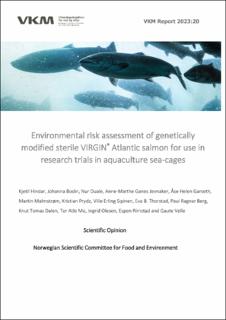| dc.contributor.author | Hindar, Kjetil | |
| dc.contributor.author | Bodin, Johanna Eva | |
| dc.contributor.author | Duale, Nur | |
| dc.contributor.author | Jevnaker, Anne-Marthe Ganes | |
| dc.contributor.author | Garseth, Åse Helen | |
| dc.contributor.author | Malmstrøm, Martin | |
| dc.contributor.author | Prydz, Kristian | |
| dc.contributor.author | Sipinen, Ville Erling | |
| dc.contributor.author | Thorstad, Eva Bonsak | |
| dc.contributor.author | Berg, Paul Ragnar | |
| dc.contributor.author | Dalen, Knut Tomas | |
| dc.contributor.author | Mo, Tor Atle | |
| dc.contributor.author | Olesen, Ingrid | |
| dc.contributor.author | Rimstad, Espen | |
| dc.contributor.author | Velle, Gaute | |
| dc.date.accessioned | 2023-10-19T07:49:12Z | |
| dc.date.available | 2023-10-19T07:49:12Z | |
| dc.date.created | 2023-10-12T12:55:27Z | |
| dc.date.issued | 2023 | |
| dc.identifier.citation | VKM Report. 2023, 2023:20 1-94. | |
| dc.identifier.issn | 2535-4019 | |
| dc.identifier.uri | https://hdl.handle.net/11250/3097449 | |
| dc.description.abstract | One of the substantial environmental challenges posed by the aquaculture industry is the escape of farmed Atlantic salmon (Salmo salar), which can mate with wild Atlantic salmon and alter the genetic composition of the wild populations. One potential solution to mitigate this issue is the cultivation of sterile salmon in aquaculture. Atlantic salmon can be made sterile by pressure or temperature treatment of newly fertilized eggs to produce triploids, which are functionally sterile due to their unpaired chromosomes. However, these triploids often perform poorly on commercial fish farms and the production of triploid salmon in Norway is put on hold due to welfare issues of the fish. In this application, the Institute of Marine Research (IMR), Bergen, seeks to rear genetically modified sterile Atlantic salmon (VIRGIN® salmon) in a marine aquaculture environment from the post-smolt stage until harvest. The research trials are to take place in small, open sea cages (net pens) at the IMR Matre Aquaculture Research Station from autumn 2023 until February 2025. The Norwegian Environment Agency has asked VKM to assess the environmental risks associated with this field trial according to the Gene Technology Act and using risk assessment guidance from the European Food Safety Authority, EFSA. | |
| dc.description.abstract | Environmental risk assessment of genetically modified sterile VIRGIN® Atlantic salmon for use in research trials in aquaculture sea-cages | |
| dc.language.iso | eng | |
| dc.subject | Genmodifisering | |
| dc.subject | Genetic modification | |
| dc.subject | Laksefisk | |
| dc.subject | Salmonids | |
| dc.subject | Feltanalyse | |
| dc.subject | Field analysis | |
| dc.subject | Akvakultur | |
| dc.subject | Aquaculture | |
| dc.title | Environmental risk assessment of genetically modified sterile VIRGIN® Atlantic salmon for use in research trials in aquaculture sea-cages | |
| dc.title.alternative | Environmental risk assessment of genetically modified sterile VIRGIN® Atlantic salmon for use in research trials in aquaculture sea-cages | |
| dc.type | Others | |
| dc.description.version | publishedVersion | |
| dc.description.version | publishedVersion | |
| dc.subject.nsi | VDP::Matematikk og naturvitenskap: 400 | |
| dc.subject.nsi | VDP::Mathematics and natural scienses: 400 | |
| dc.source.pagenumber | 1-94 | |
| dc.source.volume | 2023:20 | |
| dc.source.journal | VKM Report | |
| dc.identifier.cristin | 2184104 | |
| cristin.ispublished | true | |
| cristin.fulltext | original | |
| cristin.fulltext | original | |
| cristin.qualitycode | 1 | |
